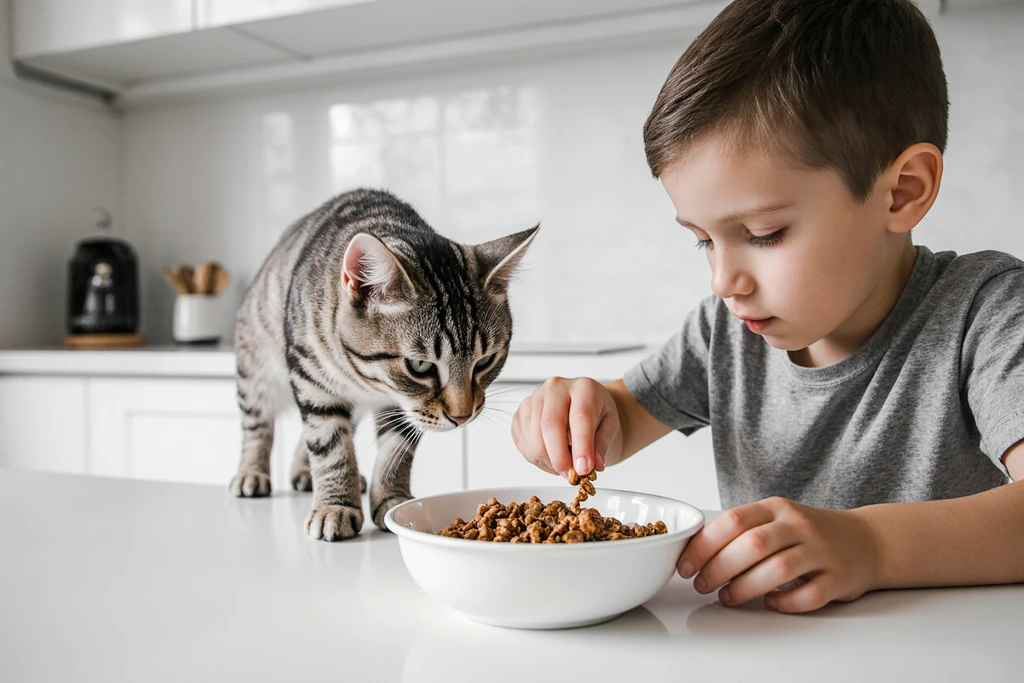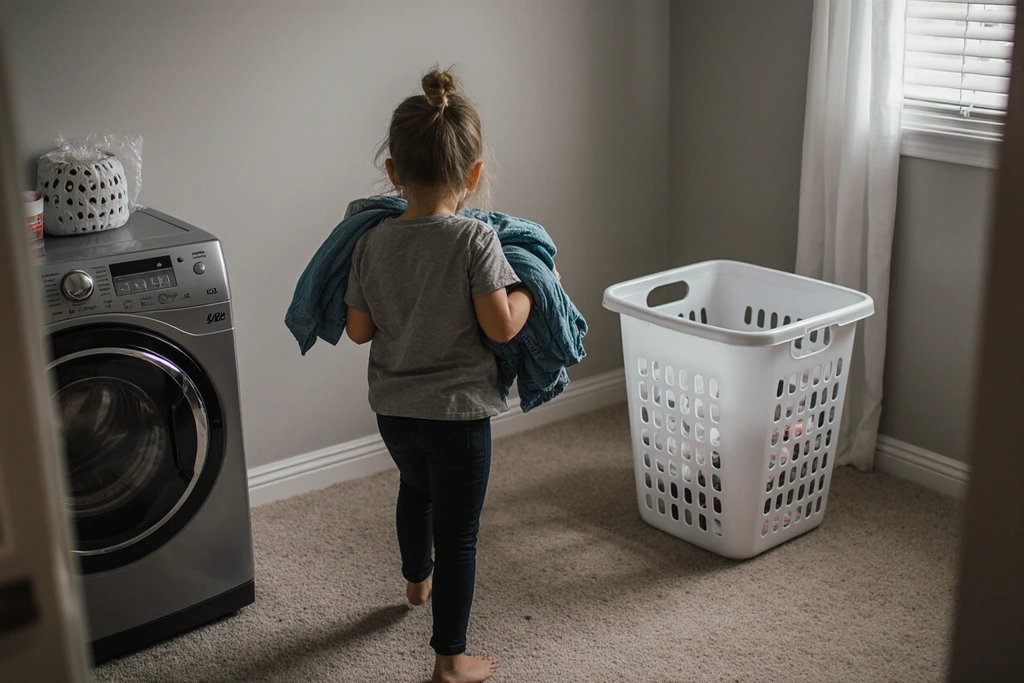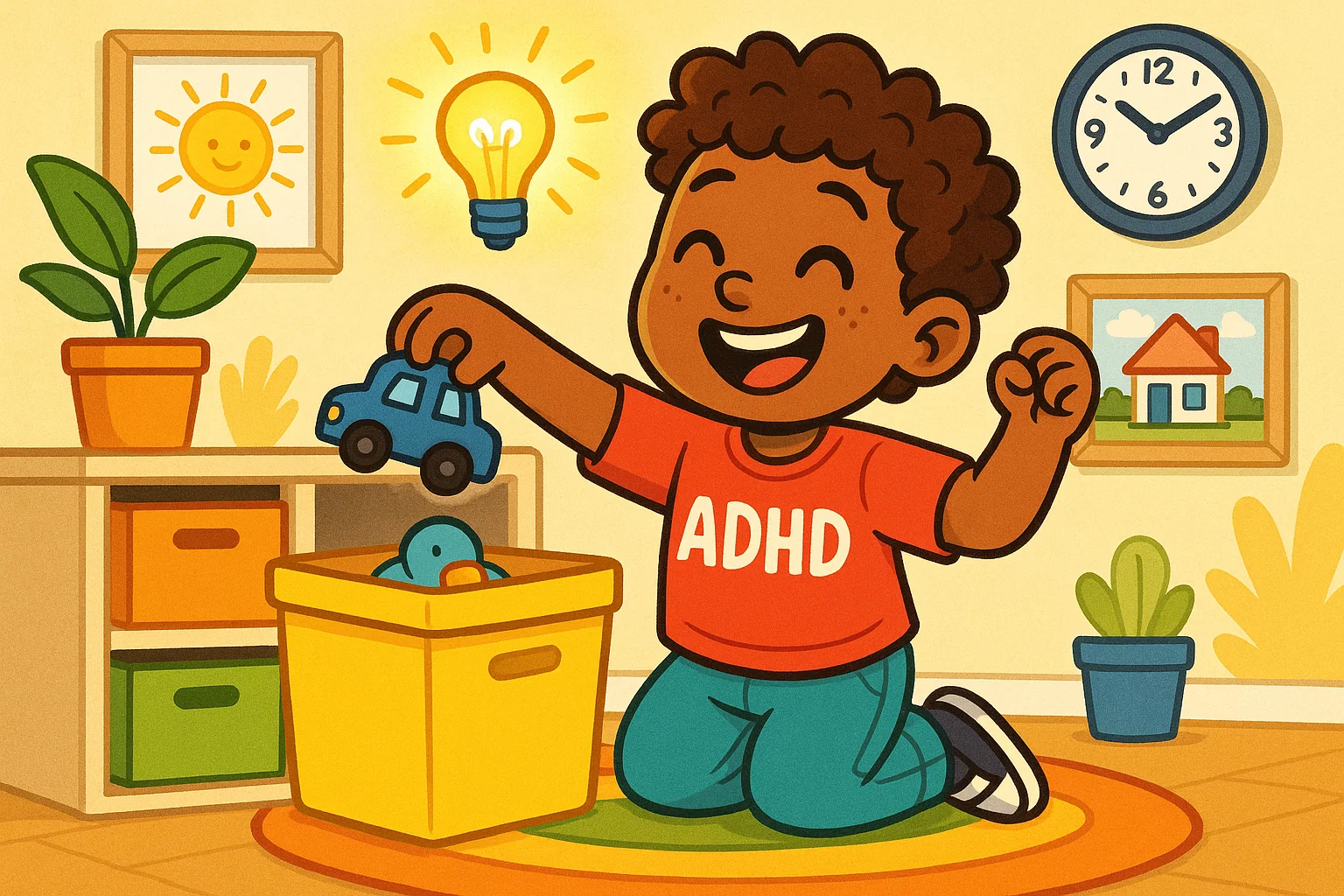Helping kids with ADHD develop responsibility through household tasks can feel overwhelming for many parents. However, when chores are implemented thoughtfully, they can become powerful tools for building executive function skills, self-esteem, and independence. This comprehensive guide explores evidence-based strategies for introducing age-appropriate tasks that work with your child’s unique neurological differences, not against them.
Age-appropriate chore ideas for adhd child
The following chores are specifically chosen for their clarity, manageability, and potential for building executive function skills. Each suggestion includes modifications for kids who may need additional support.
Feeding a pet

ent reminder Keep pet food in an easily accessible container
Sweep/vacuum a room
Physical movement combined with visible results makes this an excellent choice for many children with ADHD. The sensory input from the activity can be particularly satisfying. Success strategies:
Start with small areas (bathroom or entryway) Use lightweight, child-sized equipment when possible Create before-and-after photos to show progress Make it a timed challenge (but keep it fun, not stressful)
Set or clear the table

This chore builds counting skills, sequential thinking, and family contribution awareness. Breaking it into components makes it manageable for kids who struggle with overwhelm. Age GroupTable Setting ResponsibilitiesTime Estimate3-5 yearsPlace napkins, count out forks5-7 minutes6-9 yearsFull place setting, remember water glasses8-12 minutes10+ yearsInclude serving dishes, condiments10-15 minutes
Washing dishes or putting dishes away
This common household chore can be modified extensively to match developmental levels and sensory preferences. Some children with ADHD find the warm water and repetitive motions soothing. Adaptations for success:
Use unbreakable dishes during learning phase Create a specific order (glasses first, then plates, then utensils) Provide step stools and proper positioning Consider dishwasher loading as an alternative to hand washing
Taking dirty clothes to the hamper

This simple chore builds awareness of cleanliness and organization while providing regular movement opportunities throughout the day.
Make their bed

This chore combines fine motor skills, spatial awareness, and routine building. For kids with ADHD, this task provides a sense of accomplishment first thing in the morning. Simplification strategies:
Use comforters instead of complex sheet systems Focus on “neat enough” rather than perfection Take photos of properly made bed as visual reference Consider it complete when pillows are arranged and covers are pulled up
Pick up toys and put them away
This chore provides daily practice. Organization skills develop gradually, and this task provides daily practice. Kids with ADHD often benefit from very specific systems rather than general “clean up” instructions. Executive function support:
Use labeled bins with pictures Implement the “one type at a time” rule (all blocks first, then all cars) Set a timer for focused cleaning bursts Create a “10-toy pickup” goal instead of overwhelming room-wide cleaning chore
Clean their room (broken into specific steps)
Room cleaning can feel overwhelming for any child, but particularly for those with ADHD. Breaking this large chore into specific, sequential steps makes it manageable. Step-by-step breakdown:
Put all clothes in hamper or dresser Place books on bookshelf or desk Put toys in designated bins Make bed Clear surfaces (dresser top, nightstand)
Fold laundry
This chore combines fine motor practice, categorization skills, and contribution to family life. Start with simple items like washcloths and towels before progressing to more complex clothing.
Help pack or unpack a school bag
Executive function skills get daily practice through this essential life chore task. Children learn planning, organization, and responsibility for their belongings.
Help with meal prep (washing veggies, simple mixing tasks)
This chore builds life skills while providing sensory experiences that many kids with ADHD find regulating. Start with safe, simple tasks and gradually increase complexity.
Help put groceries away
This chore combines physical activity, categorization skills, and household systems. Children learn where items belong while contributing to family functioning.
Smart chores for balance and coordination
Kids with ADHD often benefit from tasks that incorporate movement and proprioceptive input. These “smart chores” serve dual purposes—completing necessary household work, specifically these active chores, while providing sensory regulation. Examples include:
Carrying laundry baskets (heavy work for proprioceptive input) Wiping down surfaces (bilateral coordination) Organizing closets (spatial awareness and planning) Yard work (outdoor time and physical activity)
Why chores benefit adhd kids
Children with ADHD often struggle with traditional approaches to responsibility-building, but structured household tasks, or chores, can provide the framework they need to thrive. These benefits help parents approach chores as therapeutic interventions rather than mere obligations.
Building responsibility and self-esteem
When a child with ADHD successfully completes tasks, the neurochemical reward can be particularly powerful. Dr. Russell Barkley, a leading ADHD researcher, notes that “immediate feedback from completed tasks helps strengthen the reward pathways that are often underdeveloped in children with ADHD.” The key lies in setting up achievable chore wins.
Improving focus and executive function
Executive function skills—the mental processes that include working memory, flexible thinking, and self-control—are often areas of struggle for children with ADHD. Chores naturally exercise these cognitive muscles in manageable doses. Consider the seemingly simple chore of making a bed. This activity requires:
Sequential processing (sheets first, then blanket, then pillows) Working memory (remembering each step while executing) Quality control (checking if it looks neat) Time awareness (fitting it into morning routine) Research from John Wiley suggests that children who help with household tasks, or chores, demonstrate improved executive function skills that transfer to academic and social situations.
Creating routine and reducing overwhelm
Structure is medicine for the ADHD brain. When chores become predictable parts of daily routines, they help create the external framework that many children with ADHD need to feel secure and capable. “The magic happens when chores stop being battles and start being automatic responses,” explains pediatric occupational therapist Sarah Johnson, who specializes in ADHD interventions. “We’re essentially building neural highways that make daily life smoother, especially through a consistent chore routine.”
Channeling energy positively
Many children with ADHD have abundant energy that, when channeled appropriately, becomes a superpower. Physical chores like vacuuming, carrying laundry baskets, or wiping down surfaces provide healthy outlets while contributing meaningfully to the household. Movement-based tasks, or active chores, can be particularly beneficial.
When to introduce chores to adhd child
Timing matters significantly when introducing responsibility to children with ADHD. Starting chores too early can create frustration, while waiting too long may miss critical developmental windows.
Preschool years: early responsibility basics (ages 3-5)
During these foundational years, the goal isn’t perfection—it’s building positive associations with helping through early chores. Children at this stage can handle simple, concrete tasks that have clear beginnings and endings. The developing ADHD brain benefits enormously from successful chore experiences during this period. Dr. Michelle Mowery, a developmental pediatrician, recommends focusing on chore tasks that take less than 10 minutes and have immediate, visible results.
Elementary school: building independence and structure (ages 6-9)
This developmental stage represents a sweet spot for expanding household responsibilities, including more complex chores. Children have developed better motor skills and can follow multi-step instructions, though they still need significant support and reminders. During elementary years, children with ADHD often struggle with the increased academic and social demands of school. Home-based chores can provide a sense of competence and control that balances these challenges.
Preteen years: strengthening life skills (ages 10-12)
As children approach adolescence, chores should evolve to include more complex tasks that prepare them for teenage independence. This is often when parents see the fruits of earlier consistency—children who have been doing age-appropriate tasks since early childhood typically adapt more easily to increased responsibilities. However, the preteen years can also bring new challenges. Hormonal changes, increased academic pressure, and growing social awareness can temporarily disrupt established chore routines.
Teen years: preparing for adulthood
Teenage years with ADHD require a delicate balance between increasing independence and maintaining supportive structure. Chores during this period should increasingly resemble adult responsibilities while still providing the scaffolding that ADHD brains need.


